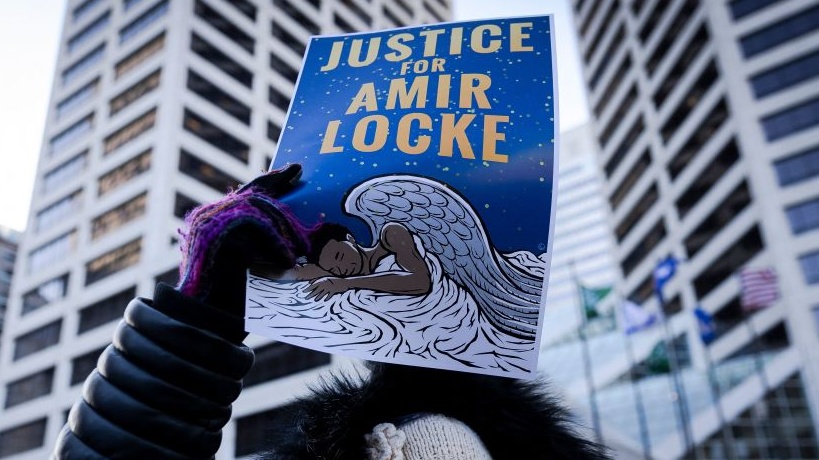Protesters continue to rally in Minneapolis to demand justice for Amir Locke, a 22-year-old Black man who died on Wednesday after being shot by police during the execution of a no-knock warrant. The shooting is also prompting the nation to revisit the issue of no-knock warrants, a topic that was widely discussed when police killed Breonna Taylor in her Louisville home in 2020.
Here are five things to know about the police killing of Locke.
Locke was not named in the warrant.
Locke, who was sleeping at his cousin's Minneapolis apartment when police raided the home, was not named in the original warrant, as Blavity previously reported. Police said the search warrant, which was related to a homicide investigation in St. Paul, remains under seal. According to Steve Linders, the public information officer with the St. Paul Police Department, the warrants are sealed to "protect the integrity of the investigation" and "until the court directs otherwise."
The 22-year-old was licensed to carry.
Police said Locke was holding a gun when officer Mark Hanneman fired three shots, killing the young man as he was removing his blanket and standing up from the couch he was sleeping on. Locke's family said their loved one was licensed to carry.
“Of course, he had his gun by his side, because where else is he going to put it? He was sleeping at somebody else’s house,” Amir's aunt, Linda Tyler, said, according to KSTP.
Attorney Ben Crump also released a statement to support the family. According to the Cut, Crump said Locke “legally possessed a firearm at the time of his death.”
Karen Wells, Locke’s mother, spoke to CNN, saying her son “made sure that he did his research, everything was going to be legal.”
His father, Andre Locke, said his son "did what any reasonable law-abiding citizen would do."
“He never even got the chance to get the cover off his head. He was startled," Andre said at a press conference, according to the Cut. "We’re not against police officers. We just want accountability.”
Judge in the Derek Chauvin trial signed off on the no-knock warrant.
Judge Peter Cahill, who was thrusted into the national spotlight during the trial of former Minneapolis police officer Derek Chauvin, signed off on the no-knock search warrant that led to the death of Amir, WCCO reports. A source who spoke to WCCO-TV said St. Paul police initially asked the Minneapolis Police Department to serve a “knock-and-announce” warrant. However, the plans changed after MPD refused to grant the original request, the source said.
According to St. Paul police, it's common to ask outside agencies to assist with the execution of a search warrant.
Amir didn't have a criminal record.
Amir's family said their loved one was a young man who had big dreams, not somebody with a criminal record. Wells said her son recently filed paperwork to start a music business. He was planning to move to Dallas to be closer with his mother and build a career as a hip-hop artist, following in the footsteps of his father, ABC News reports.
The tragedy is drawing comparison to the case of Breonna Taylor.
The nation is once again focusing on the issue of no-knock warrants following the death of Amir. It was a similar case when police raided the home of Taylor in 2020 and killed the 26-year-old Louisville woman.
"Like the case of Breonna Taylor, the tragic killing of Amir Locke shows a pattern of no-knock warrants having deadly consequences for Black Americans," Crump said in a statement.
Amid the outrage that followed the death of Taylor and George Floyd in the summer of 2020, Minneapolis announced a new policy that required officers to announce their presence and purpose before entering a house.
"The City of Minneapolis told the public that it was limiting the use of no-knock warrants to 'limit the likelihood of bad outcomes.' Less than two years later, Amir Locke and his family needlessly suffered the worst possible outcome," attorney Jeff Storms said, according to CNN. "The police department says they announced (their presence) at the threshold … but you've all seen the video, there is no announcement prior to entering that threshold. They barge in before they identify themselves and they give Amir no time to save his own life."
Minneapolis Mayor Jacob Frey has now ordered a temporary ban on no-knock warrants.
"No matter what information comes to light, it won’t change the fact that Amir Locke’s life was cut short," Frey said in a news release, according to the Cut. "To ensure safety of both the public and officers until a new policy is crafted, I’m issuing a moratorium on both the request and execution of such warrants in Minneapolis."
The mayor also said there is an exception to the temporary ban.
"To execute a no-knock warrant under the moratorium, there must be an imminent threat of harm to an individual or the public and then the warrant must be approved by the Chief," Frey said.
